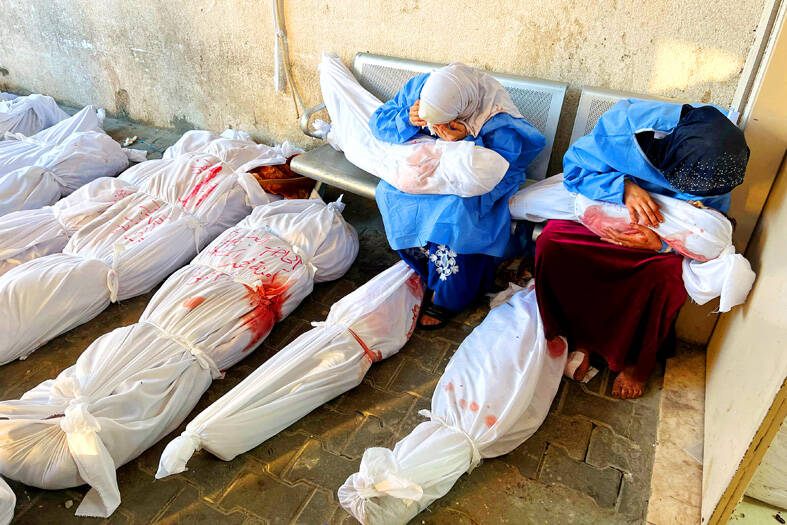Patients, staff and displaced people yesterday left Gaza’s largest hospital, health officials said, leaving behind only a skeleton crew to care for those too sick to move and Israeli forces who had taken over the facility earlier in the week.
The exodus from Al-Shifa Hospital in Gaza City came the same day Internet and phone service was restored to the Gaza Strip, ending a telecommunications blackout that forced the UN to shut down critical humanitarian aid deliveries because it was unable to coordinate its convoys.
In the south, an Israeli airstrike hit a residential building on the outskirts of the town of Khan Younis, killing at least 26 Palestinians, said a doctor at the hospital where the bodies were taken.

Photo: Reuters
Israel’s military has been searching Al-Shifa for traces of a Hamas command center that it alleges was located under the building — a claim Hamas and the hospital staff deny — and urging the several thousand people still there to leave.
Yesterday, the military said it had been asked by the hospital’s director to help those who would like to leave to do so by a secure route.
The military said it did not order any evacuation, and that medical personnel were being allowed to remain in the hospital to support patients who cannot be moved.
However, Medhat Abbas, a spokesman for the health ministry in Hamas-controlled Gaza, said the military had ordered the facility cleared, giving the hospital an hour to get people out.
After it appeared the evacuation was mostly complete, Ahmed Mokhallalati, an Al-Shifa physician, wrote on social media that there were about 120 patients remaining who were unable to leave, including some in intensive care and premature babies, and that he and five other doctors were staying behind to care for them.
It was not immediately clear where those who left the hospital had gone, with 25 of Gaza’s hospitals nonfunctional due to lack of fuel, damage and other problems, and the other 11 only partially operational, the WHO said.
Israel has said that hospitals in northern Gaza were a key target of its ground offensive aimed at crushing Hamas, and they were used as militant command centers and weapons depots, which Hamas and medical staff deny.
Israeli troops have encircled or entered several hospitals, while others stopped functioning because of dwindling supplies and loss of electricity.
Since occupying Al-Shifa, Israel has been facing pressure to prove its claim Hamas set up its main command center in and under the hospital. So far, Israel has shown photographs and video footage of weapons caches that it says were found inside, as well as what it said was a tunnel entrance.
The Associated Press could not independently verify the Israeli claims.

Taiwan is gearing up to celebrate the New Year at events across the country, headlined by the annual countdown and Taipei 101 fireworks display at midnight. Many of the events are to be livesteamed online. See below for lineups and links: Taipei Taipei’s New Year’s Party 2026 is to begin at 7pm and run until 1am, with the theme “Sailing to the Future.” South Korean girl group KARA is headlining the concert at Taipei City Hall Plaza, with additional performances by Amber An (安心亞), Nick Chou (周湯豪), hip-hop trio Nine One One (玖壹壹), Bii (畢書盡), girl group Genblue (幻藍小熊) and more. The festivities are to

Auckland rang in 2026 with a downtown fireworks display launched from New Zealand’s tallest structure, Sky Tower, making it the first major city to greet the new year at a celebration dampened by rain, while crowds in Taipei braved the elements to watch Taipei 101’s display. South Pacific countries are the first to bid farewell to 2025. Clocks struck midnight in Auckland, with a population of 1.7 million, 18 hours before the famous ball was to drop in New York’s Times Square. The five-minute display involved 3,500 fireworks launched from the 240m Sky Tower. Smaller community events were canceled across New Zealand’s

‘IRRESPONSIBLE’: Beijing’s constant disruption of the ‘status quo’ in the Taiwan Strait has damaged peace, stability and security in the Indo-Pacific region, MOFA said The Presidential Office yesterday condemned China’s launch of another military drill around Taiwan, saying such actions are a “unilateral provocation” that destabilizes regional peace and stability. China should immediately stop the irresponsible and provocative actions, Presidential Office spokeswoman Karen Kuo (郭雅慧) said, after the Chinese People’s Liberation Army (PLA) yesterday announced the start of a new round of joint exercises around Taiwan by the army, navy and air force, which it said were approaching “from different directions.” Code-named “Justice Mission 2025,” the exercises would be conducted in the Taiwan Strait and in areas north, southwest, southeast and east of Taiwan

UNDER WAY: The contract for advanced sensor systems would be fulfilled in Florida, and is expected to be completed by June 2031, the Pentagon said Lockheed Martin has been given a contract involving foreign military sales to Taiwan to meet what Washington calls “an urgent operational need” of Taiwan’s air force, the Pentagon said on Wednesday. The contract has a ceiling value of US$328.5 million, with US$157.3 million in foreign military sales funds obligated at the time of award, the Pentagon said in a statement. “This contract provides for the procurement and delivery of 55 Infrared Search and Track Legion Enhanced Sensor Pods, processors, pod containers and processor containers required to meet the urgent operational need of the Taiwan air force,” it said. The contract’s work would be